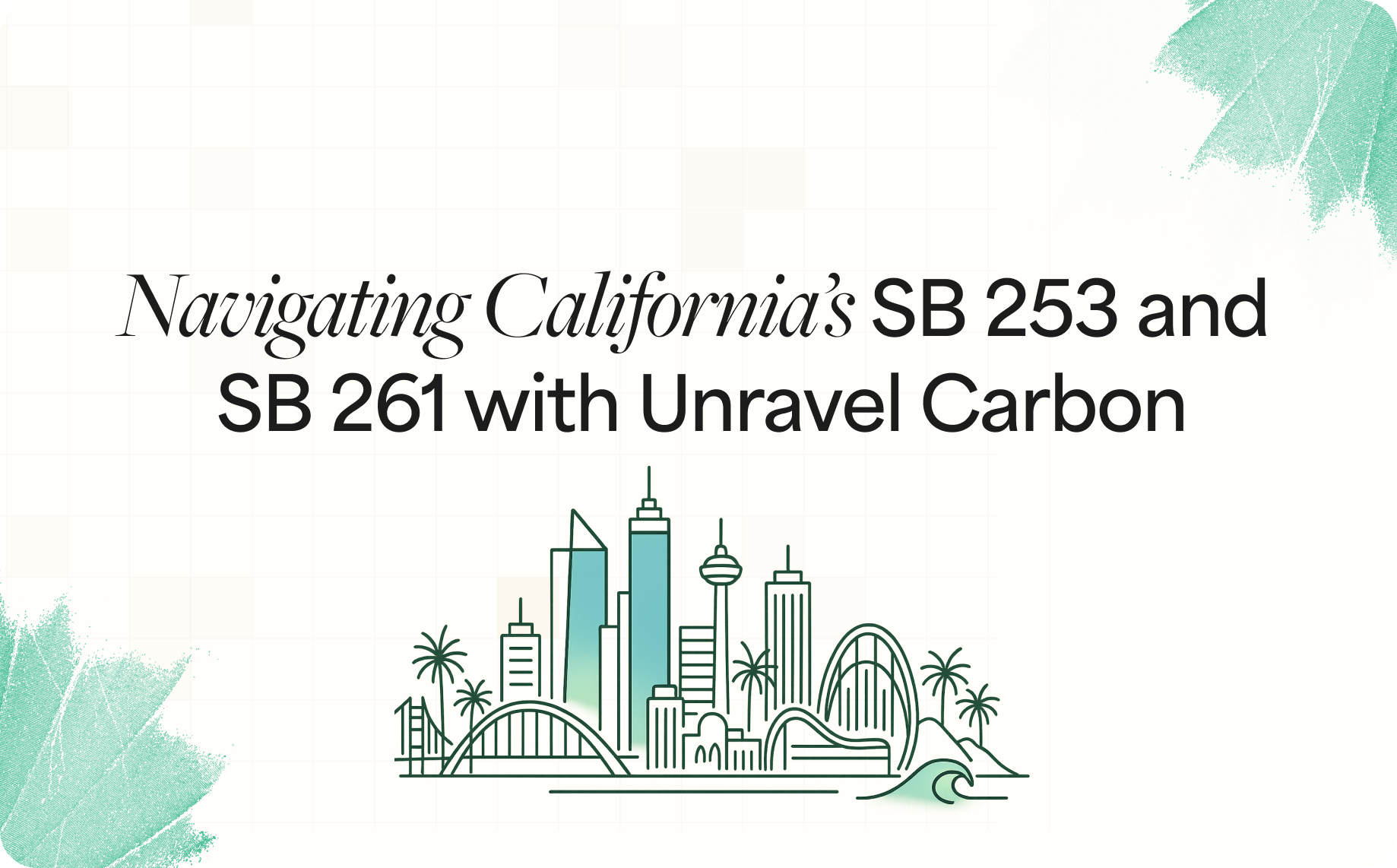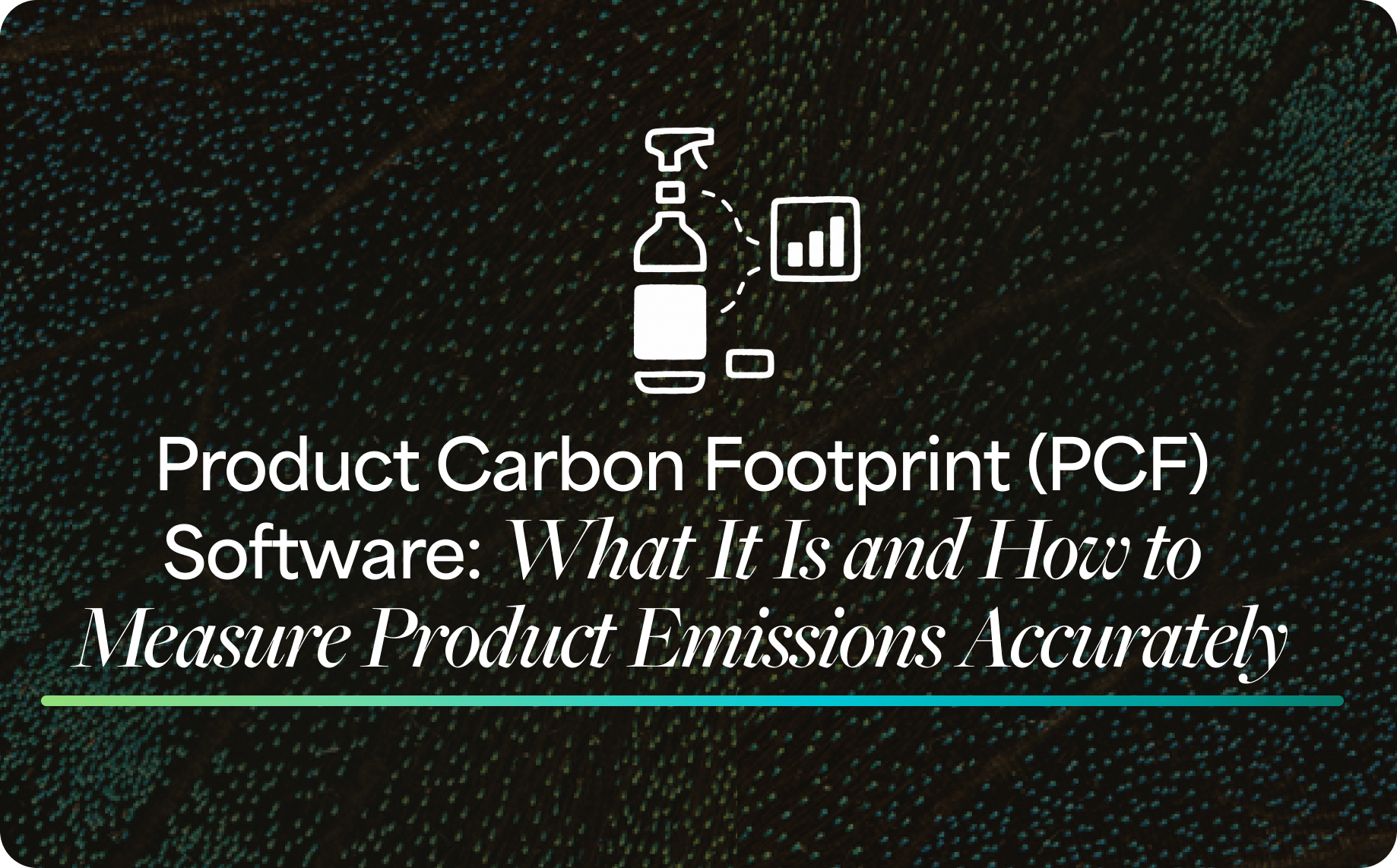California's climate disclosure laws, SB 261 and SB 253, represent a significant step forward in corporate climate accountability. These laws require organizations operating in California to disclose greenhouse gas emissions and climate-related financial risks, aligning with the state's ambitious climate goals. For many organizations, understanding and complying with these regulations can be complex and resource-intensive, particularly as CARB refines implementation guidance through Q1 2026.
Unravel Carbon's agentic platform helps organizations meet the requirements of SB 253 and SB 261 with an award-winning platform (AWS, Snowflake) and AI agents. It is certified, enterprise-grade and our customers have achieved 100% audit pass rate to date.
This article outlines the key elements of these laws and how Unravel Carbon's AI-powered platform supports compliance, enabling organizations to focus on strategic decarbonization while meeting regulatory demands.
Understanding SB 253 and SB 261: What Organizations Need to Know
SB 261: Biennial Climate-Related Financial Risk Reporting
SB 261 requires companies with over $500 million in annual global revenue to provide biennial public disclosures on climate-related financial risks. Approximately 4,100 companies are estimated to fall within scope. Reports must align with the Task Force on Climate-related Financial Disclosures (TCFD) framework or equivalent standard. The first reports under SB 261 are due by January 1, 2026.
Both laws emphasize transparency, risk management, and alignment with global climate reporting standards, creating new compliance challenges for affected organizations. While CARB has delayed final rulemaking until Q1 2026, statutory deadlines remain in effect.
SB 253: Annual GHG Emissions Disclosure
SB 253 mandates that companies with more than $1 billion in annual global revenue that "do business in California" disclose their annual Scope 1, Scope 2, and Scope 3 greenhouse gas emissions. Approximately 2,600 companies are estimated to fall within scope. The CARB has proposed June 30, 2026, as the initial deadline for Scope 1 and 2 emissions disclosure (using FY2025 data), with Scope 3 disclosures beginning in 2027.
Reporting must follow GHG Protocol standards and will require independent third-party assurance: limited assurance for Scope 1 and 2 initially, progressing to reasonable assurance by 2030. Scope 3 limited assurance is planned for 2030.
Compliance Challenges and How Unravel Carbon Addresses Them
Organizations face several hurdles in meeting SB 261 and SB 253 requirements. Unravel Carbon's platform addresses these challenges through AI automation, integrated agents, and audit-ready documentation.
Complex GHG Data Collection Across All Scopes
Gathering accurate Scope 1, 2, and 3 emissions data across multiple business units, facilities, and value chain partners is resource-intensive. Many organizations lack systematic data collection processes and face significant supplier data gaps, particularly for Scope 3.
How Unravel Carbon Addresses This:
Unravel Carbon's core platform supports rapid and accurate carbon accounting across all emissions scopes. The Emissions Calculation Agent ingests common data types, automatically understanding, mapping, and transforming the information into the required format for calculation. The platform's calculation engine is fully aligned with the GHG Protocol and integrated with extensive proprietary emission factor databases (136,000 emission factors across 400+ sources). For purchased goods and services, the platform uses a hybrid calculation method, prioritizing item-level emission factors over spend-based factors.
- Gathers data from public repositories, internal systems, suppliers, and portfolio companies
- Covers Scope 3 categories aligned with GHG Protocol
- Automatically maps materials and activities to appropriate emission factors
- Provides data completeness tracking by emission source, time period, and facility
- Identifies data gaps to ensure compliance with reporting standards
Audit Readiness and Public Transparency
Disclosures under both laws are public, increasing reputational risks if data or risk management practices are inadequate. Third-party assurance requirements demand strong audit trails and transparent calculation logic.
How Unravel Carbon Addresses This:
The Insights & Review Agent acts as an internal quality assurance tool, automating the critical process of data validation and review. The agent performs a comprehensive 10-point review of the emissions inventory and identifies data quality issues, applying corrections where possible.
Unravel Carbon's platform provides audit-ready features ensuring transparency and defensibility:
- Data History: Comprehensive audit trail tracking all changes, including user, date, facility, and emissions impact (available in all tiers)
- Emissions Sources View: Transparency into emission factor sources, publication year, and data quality ratings (available in Carbon Pro and Carbon Enterprise)
- Export to CSV: Line-by-line inputs, outputs, and complete calculation logic for external verification (available in Carbon Pro and Carbon Enterprise)
- Evidence Storage: Centralized repository for supporting documents such as invoices and utility bills (available in Carbon Enterprise)
Audit Login: Dedicated, secure login for external auditors to review data and methodologies (available in Carbon Enterprise)
The Data Collection Agent automates and simplifies the process of gathering sustainability data from diverse sources, including public data repositories, internal data owners, suppliers, and portfolio companies. The agent provides built-in guidance, automated reminders, and customizable data templates to ensure consistency, completeness and transparency.
Climate-Related Financial Risk Assessment and Reporting
Evaluating and reporting climate-related financial risks in a structured, auditable manner aligned with TCFD requires sophisticated scenario analysis and integration with enterprise risk management—capabilities many organizations lack.
How Unravel Carbon Addresses This:
Unravel Carbon's ESG Disclosures Agent (currently active) streamlines the complex process of preparing for and executing sustainability reporting and disclosures. The agent includes dedicated features for SB 261 compliance:
- Gap Analyzer Agent: Helps identify gaps in sustainability data to ensure readiness for reporting and compliance disclosures
- Reporting Agent: Enables the drafting of reports, offers flexible handling of different reporting frameworks (TCFD, IFRS S2), and conducts true peer benchmarking using actual company data
- Climate Risk Library: Includes 300+ populated risks informed by industry best practices
- AI-Assisted Writing: Generates compliant, high-quality disclosure narratives for qualitative sections
- Peer Benchmarking: Compares your organization's emissions and risk profile against industry peers
Regulatory Alignment with Evolving CARB Standards
Navigating evolving CARB guidance, overlapping state and federal disclosure requirements, and approaching deadlines demands continuous regulatory monitoring and adaptation.
How Unravel Carbon Addresses This:
Unravel Carbon maintains continuous platform updates to reflect regulatory changes. The IFRS S2 AI-assisted Reporting Module (available as part of ESG Disclosures Agent) provides a 35-step guided process tailored to SB 261 and climate risk disclosure requirements.
- 35-step guided reporting process for climate risk compliance
- GHG Protocol-compliant calculation methodologies
- Support for TCFD-aligned climate risk disclosure
- Platform updates aligned with CARB guidance
Key Features Supporting SB 253 and SB 261 Compliance
Unified ESG Data Management
The platform unifies ESG data collection and management, reducing manual errors and ensuring data integrity. Its structured repository supports audit trails and retention policies critical for regulatory compliance and verification.
Emissions Dashboard and Analytics
An intuitive emissions dashboard provides clear visualization of emissions profiles. The scope of the dashboard varies by tier: Starter ESG includes 5 dashboards and 12 charts; Carbon Pro and Carbon Enterprise include 15 dashboards and 38 charts. Benchmarking features (available as add-on) allow organizations to assess performance against industry peers.
Data Completeness Tracker
A dashboard provides a clear overview of data input completeness by emissions source, time period, and facility (available in all tiers).
AI-Assisted Data Validation
The platform provides data cleaning suggestions (date and typo fixes) with one-click implementation (available in all tiers). Anomaly detection automatically identifies statistical outliers in input data for correction before calculation (available in Carbon Pro and Carbon Enterprise).
Integration with Enterprise Systems
Unravel Carbon supports integration with ERP systems (NetSuite, SAP), HR platforms (Workday, BambooHR), and utility data sources through SFTP, direct API connections, and specialized integrations, streamlining data collection and reducing manual effort.
Why Choose Unravel Carbon for SB 253 and SB 261 Compliance?
Unravel Carbon's platform offers capabilities addressing California climate disclosure challenges:
- AI-powered agents automating data collection, calculation, validation, and reporting
- Comprehensive emissions accounting across all scopes aligned with GHG Protocol standards
- Dedicated climate risk assessment tools supporting SB 261 requirements with 300+ populated climate risks
- Data quality assurance through 10-point systematic review of emissions inventory
- Strong audit readiness with detailed data trails, evidence storage, and verification support
- Enterprise-grade security meeting ISO27001, SOC2, and AWS certification standards
Frequently Asked Questions
What types of emissions must be reported under SB 253?
SB 253 requires reporting of Scope 1 (direct), Scope 2 (indirect from purchased energy) by June 30, 2026, and Scope 3 (value chain) greenhouse gas emissions beginning in 2027.
How does Unravel Carbon help with climate-related financial risk reporting under SB 261?
Unravel Carbon's ESG Disclosures Agent provides gap identification, report drafting, flexible framework handling, and peer benchmarking using actual company data. The platform includes a Climate Risk Library with 300+ populated risks and AI-assisted writing for narrative disclosure sections.
Can Unravel Carbon's platform integrate with existing enterprise systems?
Yes, Unravel Carbon supports integration with ERP systems (NetSuite, SAP S4Hana), HR platforms (Workday, BambooHR), and utility data sources through SFTP, direct API connections, and specialized integrations.
What are the penalties for non-compliance with SB 253 and SB 261?
SB 261 imposes administrative penalties up to $50,000 per year for non-compliance. SB 253 penalties are under development by CARB, with annual program fees estimated at approximately $3,106 per covered entity.


.jpg)
.jpg)
